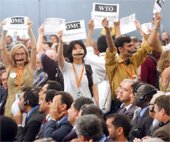Without Having Reached any Previous Deals within the WTO, Everything Will be Decided at Hong Kong's Sixth Ministerial Meeting download  [MP3 • 1,3 MB]
[MP3 • 1,3 MB]
Tuesday, December 06, 2005 • www.radiomundoreal.fm
|
The leading negotiators from the US, EU, India, Brazil, Australia and Japan, held meetings in London and Geneva over the weekend, in order to reach minimum consensus on Agriculture and NAMA chapters, just a week before the Sixth WTO Ministerial Meeting, to be held in Hong Kong, next week.
The results of the meetings were made public in a press conference, in which the negotiators did not conceal the lack of specific proposals addressed at developing countries, regarding the alleged benefits of trade liberalization, within the Doha Round, launched 4 years ago, at the 4th WTO Ministerial Meeting.
Just as it had happened at the previous WTO ministerial meetings – in Seattle and Cancun – a possible agreement to move forward in the world's trade liberalization will only be reached at the meeting itself, because no agreement was reached before.
According to Walden Bello, Executive Director of Bangkok-based Focus on the Global South, a thorough analysis of the documents reveals that agreements have been reached only in 10% of the key negotiation issues, while there is disagreement in 90% of them.
At the closing conference, the EU Trade Commissioner Peter Mandelson admitted that “the meeting was planned to reach a middle ground”, but there were only “limited advances”.
In the negotiations on agriculture – one of the hardest ones – the US and other developed countries expect that the EU to improve its offer to cut domestic subsidies and tariffs for the import of agricultural products.
This situation lasted for weeks, although Mandelson warned in early November that the European block was not not improving its offer and Brussels could not be “squeezed” anymore.
The pressure over the EU benefits the US; this country made public an offer to cut its agricultural subsidies in 60%.
According to Walden Bello, the famous US offer to cut its global agriculture subsidies in 60% is actually deceiving. It is just a reduction in the permitted levels of aid and not in the current levels. It will not only allow the current levels to remain as they are, but it will also facilitate their increase, Bello said.
Considering this scenario, the expectations of some trade ministers and negotiators of moving forward at the ministerial, started going down. A week before the beginning of the meeting, the rich countries will try to reach agreements in key areas.
On one hand, they speak about helping the poor countries, by guaranteeing the entrance of their products to the northern markets, without tariffs or quotas. On the other hand, they will try to agree on amendments to the WTO rules on patents and intellectual property rights, to facilitate the access to generic – cheaper – medicines for those countries which need to fight epidemics.
wto news 2005 | wto | www.agp.org (archives) | www.all4all.org
